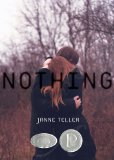Summary | Excerpt | Reviews | Beyond the Book | Read-Alikes | Genres & Themes | Author Bio

Critics' Opinion:
Readers' Opinion:
First Published:
Feb 2010, 240 pages
Paperback:
Mar 2012, 240 pages
 Book Reviewed by:
Book Reviewed by:
Cindy Anderson
Buy This Book
This article relates to Nothing
Although Nothing's protagonist, Pierre, seems to withdraw from the world, he is not necessarily a nihilist (one who believes in nothing). When he tells the other children he is "contemplating the sky, and getting used to doing nothing," and urges them to "enjoy the nothing that is," his attitude is reminiscent of the French novelist and philosopher Albert Camus. Camus and Friedrich Nietzsche both found some rationale for living inspite of the inevitability of death and the absence (in their view) of an afterlife. Trying to find a way to live life in spite of the emptiness he perceives, Pierre watches with disappointment from his plum tree at his friends who seek meaning in the world of objects (literally, in a pile of objects), rather than finding meaning within themselves. Following are a few interesting details about the philosophical movements and thinkers that play an important role in Janne Teller's story.
Existentialism
Existentialism is really an amalgam of different ways of thinking about the world, all of which pose questions about how individuals might find meaning and morality in life without depending on a personal deity. Existentialist philosophy concerns itself with many of the themes that make up the novel Nothing, particularly individualism, responsibility, choice and knowing (or trying to know) right from wrong. Two philosophers most closely associated with existentialism are Friedrich Nietzsche and Albert Camus.
Friedrich Nietzsche and Nihilism
 Nihilism is often associated with Friedrich Nietzsche (1844-1900), who was one of the first existentialists. Nietzsche actually argued against Nihilism - the view that nothing in life has value or meaning, and that existence is useless. Nietzsche believed that our social mores and values have no objective basis. Instead, he saw that morality (our idea of right and wrong) was something that emerged from culture and history. He did not believe, however, that this lack of objective morality made values meaningless. Although there are similarities, the character of Pierre does not come across as a traditional Nihilist.
Nihilism is often associated with Friedrich Nietzsche (1844-1900), who was one of the first existentialists. Nietzsche actually argued against Nihilism - the view that nothing in life has value or meaning, and that existence is useless. Nietzsche believed that our social mores and values have no objective basis. Instead, he saw that morality (our idea of right and wrong) was something that emerged from culture and history. He did not believe, however, that this lack of objective morality made values meaningless. Although there are similarities, the character of Pierre does not come across as a traditional Nihilist.
Albert Camus and Absurdism
 French Algerian writer Albert Camus (1913-1960) is known for a school of thought called Absurdism that would probably appeal to Pierre Anthon. Camus also opposed Nihilism, but did say that the "human condition" is mortality, and that the world lacks external meaning, even though we crave it. For Camus, this contradiction makes life absurd, and humans must accept the absurdity and try to live life happily. However, unlike Pierre, Camus believed that people can make their own meaning (as Pierre's classmates try to do), even if that meaning cannot be understood or felt by others.
French Algerian writer Albert Camus (1913-1960) is known for a school of thought called Absurdism that would probably appeal to Pierre Anthon. Camus also opposed Nihilism, but did say that the "human condition" is mortality, and that the world lacks external meaning, even though we crave it. For Camus, this contradiction makes life absurd, and humans must accept the absurdity and try to live life happily. However, unlike Pierre, Camus believed that people can make their own meaning (as Pierre's classmates try to do), even if that meaning cannot be understood or felt by others.
Filed under People, Eras & Events
![]() This "beyond the book article" relates to Nothing. It originally ran in March 2010 and has been updated for the
March 2012 paperback edition.
Go to magazine.
This "beyond the book article" relates to Nothing. It originally ran in March 2010 and has been updated for the
March 2012 paperback edition.
Go to magazine.





The House on Biscayne Bay
by Chanel Cleeton
As death stalks a gothic mansion in Miami, the lives of two women intertwine as the past and present collide.

The Flower Sisters
by Michelle Collins Anderson
From the new Fannie Flagg of the Ozarks, a richly-woven story of family, forgiveness, and reinvention.

The Funeral Cryer by Wenyan Lu
Debut novelist Wenyan Lu brings us this witty yet profound story about one woman's midlife reawakening in contemporary rural China.
Your guide toexceptional books
BookBrowse seeks out and recommends the best in contemporary fiction and nonfiction—books that not only engage and entertain but also deepen our understanding of ourselves and the world around us.